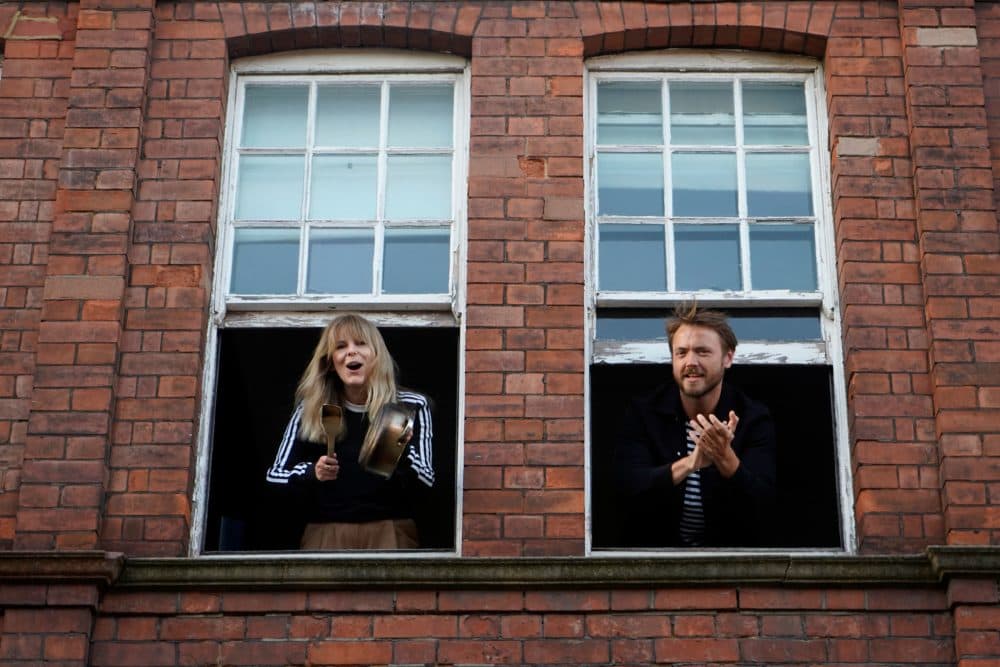Advertisement
First Person: Stress Scientist Elissa Epel On Where She Finds Hope

It's been 15 months now since the start of the COVID-19 pandemic worldwide. So we've been checking in with guests who joined us over the course of last year to see how they're doing, see how they're feeling and what they think about the experience of the past more than a year of their lives.
Elissa Epel is a professor in the Department of Psychiatry at the University of California, San Francisco, where she studies stress. She joined us on the show in March of last year to talk about resilience in the face of social isolation caused by the COVID shutdowns. In the latest First Person diary, she recalled her mindset in the early days of the pandemic:
ELISSA EPEL: We were still in acute adjustment stage, and we were still figuring out, "What is this?" So we had lots of different types of reactions. Some of us had panic buying. There were a lot of catastrophic thoughts about where this might go.
And then there was a lot of rising up to the moment. You say, "Today we can sing."
The sound of the songs of people in Italy singing opera from their balcony is such a heartwarming memory of the human spirit in times of distress, rising up for social solidarity.
And then we had the stage of clanging pans ... on our balconies or out our windows for healthcare providers. So there were all these beautiful moments of humans wanting to help others and have a voice.
Could this be that this is going to leave us in a chapter with a stronger social fabric, with more social solidarity with people actually caring for their neighbors? And it was such a hope, such an amazing thought that we would end up there. And I do think that we have edged there, but we're still in crisis. So we're still separated in many different cities and states, and we're now looking at the upswing of another wave.
And so on one hand, we know what to do, and this is such old news. And boy, we've been through this before — of shutting down and testing and masking. And on the other hand, this is really devastating news to people whose income can't survive in another shutdown and to youth. They've had the biggest hit to mental health of all of our age strata. The mental health data shows that it's our youth who have had the most depression and the dramatic increases in suicidal thoughts. And so, it's with a lot of dread that I see this new wave coming to us.
Advertisement
One of the hardest moments was when I realized that our son was creating a very, very negative view of people, and I'm such an optimist that it was a shock to me that he doesn't have hope for the climate crisis, that he thinks that there's more bad people than good. And then I realized that so much of what he's seeing and what we talk about at dinner is about the crises and about things that concern us. And so, we have made a point to not watch the news. We still get high quality news. So, I don't know how quickly or how much he will change his views of the world, but it really breaks my heart.
I would say it's a it's a daily conversation, and our views about human behavior and our future is depending in part what we pay attention to each day. So there is bad news that we could pay attention to, and there's also good news and good things that people do. And so, really shifting our focus to be hopeful and to focus on all the good in the world. I find that when I get very distressed about the climate situation here, my whole outlook changes after talking with someone who knows more than I do about all of the great changes that are happening for climate — in policy and technology, actions of people in different countries. And these people are climate experts.
And so I get my hope from true experts who have been in this field for decades. And they see, of course, the dreaded changes to climate, but they also see that the world is waking up to the changes we need and that all over, great things are happening. And when we each do our bit together, it will make a difference. And I consciously decided to hold that positive view and work toward that.
In this diary ... we hear from:
Elissa Epel, stress scientist and psychiatry professor at the University of California, San Francisco. (@Dr_Epel)
This segment aired on August 19, 2021.